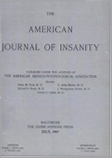PROGNOSTIC CRITERIA IN SCHIZOPHRENIA
Abstract
On the basis of a critical survey of the literature, the following conclusions are drawn concerning the significance of the various criteria of prognosis in schizophrenia:
The prognosis is most favorable when the duration of illness is short; the type of onset acute; exogenic precipitating factors, obvious; the element of confusion and the presence of atypical symptoms (especially manic-depressive symptoms), prominent in the early symptomatology; and when process symptoms are minimal or absent. Conversely, when these conditions are reversed, the prognosis is least favorable. This group of criteria is of the greatest import in the assessment of prognosis in schizophrenia.
Certain other factors seem to have some significance, although their relative prognostic importance cannot be clearly evaluated at the present time. Patients with a history of a previous episode of illness appear to have a better chance of remission; the more so, the longer the interval of time between attacks, the more complete the recovery during the preceding remission, and the greater the dissimilarity between the present and previous episodes. The incidence of manic-depressive psychoses in the hereditary background may be related to the development of atypical symptoms and thus favorably influence the outcome of the illness. From a prognostic point of view, asthenic body type is unfavorable, pyknic favorable; due to possible technical error, caution is required in classification of body-type. Extravert temperament and adequate pre-psychotic life-adjustment offer a more favorable outlook, in contrast to introversion and inadequacy of reaction to life situations. However, it should be noted that evaluation of these factors on the basis of information obtained from relatives and friends is only approximate. In general, the catatonic subtype offers the best prognosis and paranoids the worst, with simple and hebephrenic subtypes in an intermediate position. Acute cases which are so atypical as not to allow classification under any of these four subtypes, are especially favorable prognostically. A progressive hospital course is ominous, whereas improvement or fluctuation is indicative of a more favorable outcome.
Male or female sex, education and abilities, and psycho-sexual history seem to have no prognostic significance. Likewise the factor of age at onset of illness does not contribute to the assessment of outcome, except that relatively late age offers an unfavorable prognosis.
Access content
To read the fulltext, please use one of the options below to sign in or purchase access.- Personal login
- Institutional Login
- Sign in via OpenAthens
- Register for access
-
Please login/register if you wish to pair your device and check access availability.
Not a subscriber?
PsychiatryOnline subscription options offer access to the DSM-5 library, books, journals, CME, and patient resources. This all-in-one virtual library provides psychiatrists and mental health professionals with key resources for diagnosis, treatment, research, and professional development.
Need more help? PsychiatryOnline Customer Service may be reached by emailing [email protected] or by calling 800-368-5777 (in the U.S.) or 703-907-7322 (outside the U.S.).



